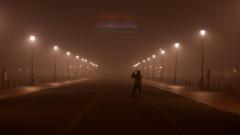Air pollution in Delhi reached alarming levels on Monday afternoon, with pollution monitors recording a staggering Air Quality Index (AQI) value of 1,500 at around 15:00 IST. This figure is 15 times above the World Health Organization's (WHO) recommended threshold for safe breathing, leading to the classification of Delhi's air as "severe plus" by India's pollution control authorities. Thick smog has brought daily life to a standstill, disrupting flight services, prompting school closures, and resulting in a halt to construction activities in the capital.
As the pollution crisis escalates, authorities have implemented additional measures, including banning non-essential trucks from entering the city and mandating that half of office staff work from home to combat the intensity of the smog. The Delhi government has also banned coal and firewood usage, along with restricting the operation of diesel generators except in emergencies—a direct response to last week's hazardous conditions.
Historically, the winter months in northern India, particularly from October to January, have been marred by rising pollution levels due to agricultural burning, vehicular emissions, and other local factors. Residents are no strangers to these annual challenges, yet this year appears particularly severe. On social media, individuals expressed their frustration, describing their struggles with respiratory issues and calling for mass protests against the toxic air.
Delhi's Chief Minister Atishi has deemed the pollution crisis a "medical emergency," attributing the dire conditions largely to stubble burning continuing in neighboring states like Haryana, Uttar Pradesh, and Bihar. The ongoing political tussle sees the ruling Bharatiya Janata Party (BJP) and the Aam Aadmi Party (AAP) trading blame over the city's inability to effectively tackle pollution.
In a situation where residents feel the effects of poor air quality both indoors and outdoors, experts caution that without appropriately coordinated urban and environmental policy responses, Delhi's air quality may worsen in the ensuing days, highlighting the urgent need for effective governance to address the underpinnings of this chronic issue.



















